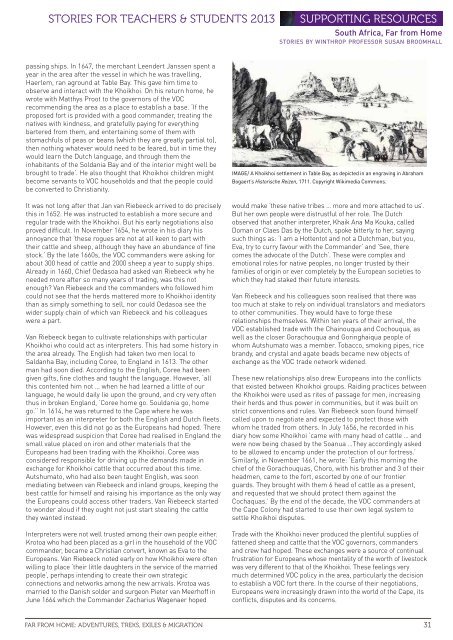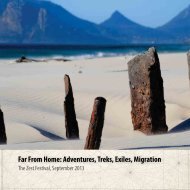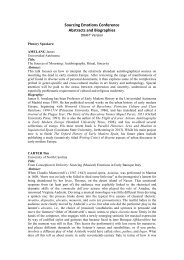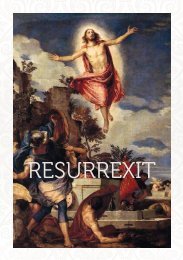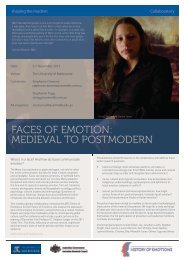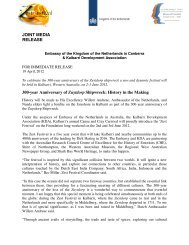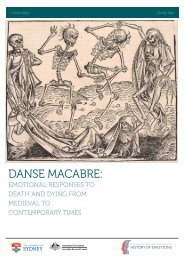Download our K-12 education pack - ARC Centre of Excellence for ...
Download our K-12 education pack - ARC Centre of Excellence for ...
Download our K-12 education pack - ARC Centre of Excellence for ...
Create successful ePaper yourself
Turn your PDF publications into a flip-book with our unique Google optimized e-Paper software.
stories <strong>for</strong> teachers & students 2013<br />
Supporting Res<strong>our</strong>ces<br />
South Africa, Far from Home<br />
stories by winthrop pr<strong>of</strong>essor susan broomhall<br />
passing ships. In 1647, the merchant Leendert Janssen spent a<br />
year in the area after the vessel in which he was travelling,<br />
Haerlem, ran aground at Table Bay. This gave him time to<br />
observe and interact with the Khoikhoi. On his return home, he<br />
wrote with Matthys Proot to the governors <strong>of</strong> the VOC<br />
recommending the area as a place to establish a base. ‘If the<br />
proposed <strong>for</strong>t is provided with a good commander, treating the<br />
natives with kindness, and gratefully paying <strong>for</strong> everything<br />
bartered from them, and entertaining some <strong>of</strong> them with<br />
stomachfuls <strong>of</strong> peas or beans (which they are greatly partial to),<br />
then nothing whatever would need to be feared, but in time they<br />
would learn the Dutch language, and through them the<br />
inhabitants <strong>of</strong> the Soldania Bay and <strong>of</strong> the interior might well be<br />
brought to trade’. He also thought that Khoikhoi children might<br />
become servants to VOC households and that the people could<br />
be converted to Christianity.<br />
It was not long after that Jan van Riebeeck arrived to do precisely<br />
this in 1652. He was instructed to establish a more secure and<br />
regular trade with the Khoikhoi. But his early negotiations also<br />
proved difficult. In November 1654, he wrote in his diary his<br />
annoyance that ‘these rogues are not at all keen to part with<br />
their cattle and sheep, although they have an abundance <strong>of</strong> fine<br />
stock.’ By the late 1660s, the VOC commanders were asking <strong>for</strong><br />
about 300 head <strong>of</strong> cattle and 2000 sheep a year to supply ships.<br />
Already in 1660, Chief Oedasoa had asked van Riebeeck why he<br />
needed more after so many years <strong>of</strong> trading, was this not<br />
enough Van Riebeeck and the commanders who followed him<br />
could not see that the herds mattered more to Khoikhoi identity<br />
than as simply something to sell, nor could Oedasoa see the<br />
wider supply chain <strong>of</strong> which van Riebeeck and his colleagues<br />
were a part.<br />
Van Riebeeck began to cultivate relationships with particular<br />
Khoikhoi who could act as interpreters. This had some history in<br />
the area already. The English had taken two men local to<br />
Saldanha Bay, including Coree, to England in 1613. The other<br />
man had soon died. According to the English, Coree had been<br />
given gifts, fine clothes and taught the language. However, ‘all<br />
this contented him not … when he had learned a little <strong>of</strong> <strong>our</strong><br />
language, he would daily lie upon the ground, and cry very <strong>of</strong>ten<br />
thus in broken England, ‘Coree home go. Souldania go, home<br />
go.’’ In 1614, he was returned to the Cape where he was<br />
important as an interpreter <strong>for</strong> both the English and Dutch fleets.<br />
However, even this did not go as the Europeans had hoped. There<br />
was widespread suspicion that Coree had realised in England the<br />
small value placed on iron and other materials that the<br />
Europeans had been trading with the Khoikhoi. Coree was<br />
considered responsible <strong>for</strong> driving up the demands made in<br />
exchange <strong>for</strong> Khoikhoi cattle that occurred about this time.<br />
Autshumato, who had also been taught English, was soon<br />
mediating between van Riebeeck and inland groups, keeping the<br />
best cattle <strong>for</strong> himself and raising his importance as the only way<br />
the Europeans could access other traders. Van Riebeeck started<br />
to wonder aloud if they ought not just start stealing the cattle<br />
they wanted instead.<br />
Interpreters were not well trusted among their own people either.<br />
Krotoa who had been placed as a girl in the household <strong>of</strong> the VOC<br />
commander, became a Christian convert, known as Eva to the<br />
Europeans. Van Riebeeck noted early on how Khoikhoi were <strong>of</strong>ten<br />
willing to place ‘their little daughters in the service <strong>of</strong> the married<br />
people’, perhaps intending to create their own strategic<br />
connections and networks among the new arrivals. Krotoa was<br />
married to the Danish solder and surgeon Pieter van Meerh<strong>of</strong>f in<br />
June 1664 which the Commander Zacharius Wagenaer hoped<br />
IMAGE/ A Khoikhoi settlement in Table Bay, as depicted in an engraving in Abraham<br />
Bogaert’s Historische Reizen, 1711. Copyright Wikimedia Commons.<br />
would make ‘these native tribes … more and more attached to us’.<br />
But her own people were distrustful <strong>of</strong> her role. The Dutch<br />
observed that another interpreter, Khaik Ana Ma Kouka, called<br />
Doman or Claes Das by the Dutch, spoke bitterly to her, saying<br />
such things as: ‘I am a Hottentot and not a Dutchman, but you,<br />
Eva, try to curry fav<strong>our</strong> with the Commander’ and ‘See, there<br />
comes the advocate <strong>of</strong> the Dutch’. These were complex and<br />
emotional roles <strong>for</strong> native peoples, no longer trusted by their<br />
families <strong>of</strong> origin or ever completely by the European societies to<br />
which they had staked their future interests.<br />
Van Riebeeck and his colleagues soon realised that there was<br />
too much at stake to rely on individual translators and mediators<br />
to other communities. They would have to <strong>for</strong>ge these<br />
relationships themselves. Within ten years <strong>of</strong> their arrival, the<br />
VOC established trade with the Chainouqua and Cochouqua, as<br />
well as the closer Gorachouqua and Goringhaiqua people <strong>of</strong><br />
whom Autshumato was a member. Tobacco, smoking pipes, rice<br />
brandy, and crystal and agate beads became new objects <strong>of</strong><br />
exchange as the VOC trade network widened.<br />
These new relationships also drew Europeans into the conflicts<br />
that existed between Khoikhoi groups. Raiding practices between<br />
the Khoikhoi were used as rites <strong>of</strong> passage <strong>for</strong> men, increasing<br />
their herds and thus power in communities, but it was built on<br />
strict conventions and rules. Van Riebeeck soon found himself<br />
called upon to negotiate and expected to protect those with<br />
whom he traded from others. In July 1656, he recorded in his<br />
diary how some Khoikhoi ‘came with many head <strong>of</strong> cattle … and<br />
were now being chased by the Soanua …They accordingly asked<br />
to be allowed to encamp under the protection <strong>of</strong> <strong>our</strong> <strong>for</strong>tress.’<br />
Similarly, in November 1661, he wrote: ‘Early this morning the<br />
chief <strong>of</strong> the Gorachouquas, Choro, with his brother and 3 <strong>of</strong> their<br />
headmen, came to the <strong>for</strong>t, escorted by one <strong>of</strong> <strong>our</strong> frontier<br />
guards. They brought with them 6 head <strong>of</strong> cattle as a present,<br />
and requested that we should protect them against the<br />
Cochaquas.’ By the end <strong>of</strong> the decade, the VOC commanders at<br />
the Cape Colony had started to use their own legal system to<br />
settle Khoikhoi disputes.<br />
Trade with the Khoikhoi never produced the plentiful supplies <strong>of</strong><br />
fattened sheep and cattle that the VOC governors, commanders<br />
and crew had hoped. These exchanges were a s<strong>our</strong>ce <strong>of</strong> continual<br />
frustration <strong>for</strong> Europeans whose mentality <strong>of</strong> the worth <strong>of</strong> livestock<br />
was very different to that <strong>of</strong> the Khoikhoi. These feelings very<br />
much determined VOC policy in the area, particularly the decision<br />
to establish a VOC <strong>for</strong>t there. In the c<strong>our</strong>se <strong>of</strong> their negotiations,<br />
Europeans were increasingly drawn into the world <strong>of</strong> the Cape, its<br />
conflicts, disputes and its concerns.<br />
FAR FROM HOME: ADVENTURES, TREKS, EXILES & MIGRATION<br />
31


